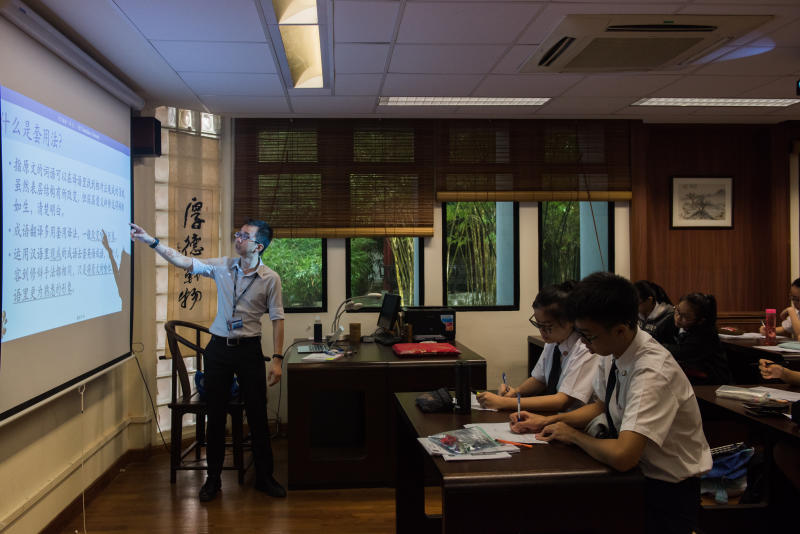Parliament: Pupils exempted from mother tongue language will be treated fairly under new PSLE scoring system, says Indranee
Sign up now: Get ST's newsletters delivered to your inbox

The Education Ministry has said that in the new system, pupils exempted from taking a mother tongue language (MTL) will be assigned an MTL score between AL6 and AL8 so that they can have a PSLE score of four subjects for their Secondary 1 posting.
PHOTO: ST FILE
Jolene Ang
Follow topic:
SINGAPORE - Pupils with special education needs who are exempted from taking a mother tongue language (MTL) have been, and will be treated fairly when the new Primary School Leaving Examination (PSLE) scoring system is implemented.
Second Minister for Education Indranee Rajah gave the House this assurance on Monday (Sept 2) when explaining why a score will be assigned to them even though they did not take MTL.
She said the correct score for someone who did not take MTL "should actually be a zero".
But, she added: "With secondary school posting, it is necessary to see how that child compares with other children. And if you apply it very, very strictly, then given that you didn't take MTL, the correct score should actually be zero, meaning you have the worst possible score.
"And we didn't want to do that. So to be fair, we have to impute or assign a score."
Currently, pupils exempted from MTL are given a four-subject score by referring to how their peers with similar scores in English, mathematics and science performed, including those offering Foundation MTL.
In the new system, which takes effect in 2021, each Standard-level PSLE subject is scored using eight bands known as Achievement Levels (AL), with AL1 being the best score and AL8, the worst.
Foundation-level subjects - a subset of the curriculum covered at the Standard level for those who are weaker in the subject - will be pegged to AL6 to AL8 of the Standard-level subjects.
The Education Ministry has said that in the new system, pupils exempted from MTL will be assigned an MTL score between AL6 and AL8 so that they can have a PSLE score of four subjects for their Secondary 1 posting.
Replying to Ms Denise Phua (Jalan Besar GRC), who had asked about the underlying principles of the practice, Ms Indranee said: "The new AL scoring system is based on the level of attainment by the student himself, and moves us away from the approach of the T-score system where a student has to outperform his peers to register a high score.
"However, when it comes to secondary school posting, the student still needs to use his PSLE score to compete with other students to be admitted into a school of his choice.
"Our treatment of students exempted from MTL is aligned with these principles.''
Parents have expressed concern about the method, and an online petition to change it was launched last month. Many who signed it felt it is pegged too low compared with the Standard-level subjects.
In Parliament on Monday, three MPs questioned the rationale for the scoring policy, and asked whether it would further disadvantage pupils with special education needs.
Ms Indranee pointed out that receiving AL6 for the fourth subject "doesn't automatically disqualify a student from accessing a particular course or his first-choice secondary school".
For example, a student who got two AL5s and two AL6s would get a PSLE score of 22, which makes him eligible for the Express stream, she said.
Simulations using the most recent PSLE results, she added, also show a similar proportion of students with special education needs who are exempted from MTL, would qualify for the Express course under both the new and old scoring systems.
Holding choice patterns constant, 60 per cent of pupils in this group would also be able to secure their first choice secondary school in either system.
Elaborating further, she said that currently, about 70 per cent of students with special education needs in mainstream schools take MTL at PSLE.
Another 90 per cent of returning Singaporean students do the subject, with their schools tailoring teaching and learning methods for them.
On average, about 4.5 per cent of students are exempted from MTL.
"As the score range for those taking Foundation MTL is AL6 to AL8, it would be difficult to justify to those offering it why another student who did not sit for the exam could be assigned a higher score," she said.
Ms Indranee also highlighted other pathways to secondary schools, like the Direct School Admission (DSA) route which the ministry said has "significantly expanded" to recognise talents and achievements across different domains.
Schools are also admitting more students - including those with special education needs - with different strengths and backgrounds.
"For example, we see students with special education needs who are talented in mathematics, science, sports and performing arts, and admitted via DSA into the schools of their choices," she said.
"Ultimately in grading, scores have to reflect standards," she said.
Also, PSLE performance is just one checkpoint in a child's education journey, "and not the final judgement of a child's ability or potential", she stressed.
"Fundamentally, we want an education system with multiple pathways and opportunities, so that every child can maximise their potential and be placed in good stead for the future."

